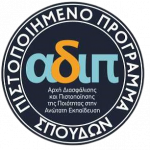
Τμήμα Πολιτικής Επιστήμης και Διεθνών Σχέσεων
«Πανεπιστήμιο της Κοινωνίας»




Το Τμήμα Πολιτικής Επιστήμης και Διεθνών Σχέσεων (ΠΕΔιΣ) του Πανεπιστημίου Πελοποννήσου λειτουργεί από το ακαδημαϊκό έτος 2007-2008 με βάση το Προεδρικό Διάταγμα 118/2003 (ΦΕΚ 102, τεύχος Α’) και ανήκει στη Σχολή Κοινωνικών και Πολιτικών Επιστημών που εδρεύει στην Κόρινθο. Η εισαγωγή των πρώτων φοιτητών/τριών πραγματοποιήθηκε το ακαδημαϊκό έτος 2007-2008. Σκοπός του Τμήματος είναι η άρτια επιστημονική κατάρτιση των φοιτητών/τριών στα αντικείμενα της Πολιτικής Επιστήμης, των Διεθνών Σχέσεων, της Διεθνούς Πολιτικής Οικονομίας, των Σπουδών Περιοχής, των Νέων Τεχνολογιών, της Διεθνούς και Ευρωπαϊκής Ιστορίας, του Πολιτισμού, του Δικαίου, της Κοινωνιολογίας και της Φιλοσοφίας. Το πρόγραμμα σπουδών ανταποκρίνεται στα καλύτερα διεθνή ακαδημαϊκά πρότυπα και, ταυτόχρονα, προσφέρει δεξιότητες και δυνατότητες που συνάδουν με τις τάσεις στην αγορά εργασίας...

Το Πρόγραμμα Προπτυχιακών Σπουδών (ΠΠΣ) του ΠΕΔιΣ επιδιώκει οι απόφοιτοι/ες του Τμήματος να αποκτούν προσόντα που αναγνωρίζονται σε σπουδαστές του πρώτου κύκλου σπουδών της τριτοβάθμιας εκπαίδευσης. Τα προσόντα αυτά που καλλιεργούνται και αναδεικνύονται είναι συμβατά με τους Δείκτες Επιπέδου Έξι (6) του Εθνικού και Ευρωπαϊκού Πλαισίου Επαγγελματικών Προσόντων. Γενικότερα, κεντρικός σκοπός του ΠΠΣ είναι η συστηματική ακαδημαϊκή εκπαίδευση και η άρτια επιστημονική κατάρτιση των φοιτητών/φοιτητριών του ΠΕΔιΣ στα γνωστικά πεδία της «Πολιτικής Επιστήμης» και των «Διεθνών Σχέσεων» και η διεπιστημονική διασύνδεσή τους με τη Διεθνή Πολιτική Οικονομία, τις Σπουδές Περιοχής, τις Σπουδές Πολιτισμού, τη Σύγχρονη Ιστορία, την Κοινωνιολογία, τη Φιλοσοφία, το Δίκαιο και τα Πληροφοριακά Συστήματα. ...

Το Τμήμα διοργανώνει από το 2012-2013 Μεταπτυχιακά Προγράμματα Σπουδών, τα οποία καλύπτουν σύγχρονα ζητήματα και ανταποκρίνονται πλήρως στην ανάγκη απόκτησης νέων γνώσεων και δεξιοτήτων. Το Τμήμα έχει αποκτήσει εξαιρετική εμπειρία στον τομέα αυτό, βελτιώνει διαρκώς την ποιότητα των σπουδών με νέα μαθήματα, υψηλού επιπέδου διδακτικό προσωπικό και νέες συνεργασίες με Τμήματα και Πανεπιστήμια του εξωτερικού και της Ελλάδας.

Η έρευνα συνιστά τον ακρογωνιαίο λίθο της επιστημονικής ανάπτυξης του Τμήματος Πολιτικής Επιστήμης και Διεθνών Σχέσεων. Τα μέλη ΔΕΠ του Τμήματός μας έχουν αναπτύξει μία πολυσχιδή και έντονη επιστημονική δραστηριότητα με σημαντική αναγνώριση στην Ελλάδα και το εξωτερικό. Παράλληλα με την ατομική ερευνητική δραστηριότητα, στο Τμήμα Πολιτικής Επιστήμης και Διεθνών Σχέσεων λειτουργούν Ερευνητικές Ομάδες μέσω των οποίων εξασφαλίζεται η διεπιστημονική συνεργασία, η συνεργασία με άλλα Πανεπιστήμια, η υλοποίηση ερευνητικών προγραμμάτων, ενώ παράλληλα, δίδεται η δυνατότητα συμμετοχής φοιτητών και αποφοίτων του Τμήματος. ...